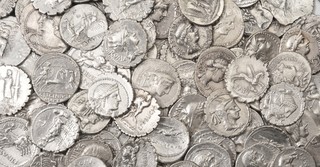Why Was There a Roman Census at the Time of Jesus' Birth?
Share

Luke 2:1 is the traditional starting point for many for the yearly reading of the Christmas story: “In those days Caesar Augustus issued a decree that a census should be taken of the entire Roman world.”
And thus begins the earthly story of the greatest king of all time — and not the man with the lofty title “Caesar Augustus.” Rather, Caesar was unwittingly helping to set an ancient prophecy in motion.
Of course, it’s doubtful anyone was grateful for the census at the time, probably least of all the pregnant Mary. She and her betrothed, Joseph, were members of a conquered people group, forced to travel about 90 miles to be counted for the census of the conquering empire so that it might know just how many people it had available to tax.
So how did a Roman census lead to the fulfillment of prophecy and one of the most beloved stories of all time? That’s what we’re here to explore.
What Is a Census?
In the simplest terms, taking a census is just officially counting people. Countries today conduct in-depth censuses, mostly for taxation purposes, and it wasn’t much different in Rome. So why was the census implemented in Rome at the time?
Caesar Augustus was fond of censuses. It took a lot of taxes to keep the enormous Roman army going, to build roads, and to finance military campaigns to continue conquering the known world. Caesar Augustus was also just generally a luxurious emperor. He recorded in his “Res Gestae Divi Avgvsti” (“The Deeds of Divine Augustus”— quite a fancy name for a diary) that he ordered widespread censuses of Rome at least three times in 28 B.C., 8 B.C., and 14 A.D.
More localized censuses also took place regularly in certain areas of the Roman Empire; Judea faced at least three censuses around the time of the birth of Christ, in 8 B.C., 2 B.C., and 6 A.D.
The Romans were record keepers and empire builders. Censuses came with the territory.
Who Was Caesar Augustus?
Caesar Augustus was the self-chosen title of a man by the name of Octavian, or Gaius Octavius. He was born in 63 B.C. and was adopted by his great uncle, Julius Caesar. Julius Caesar, dictator of Rome, famously attempted to set himself up as the supreme leader of the Roman Republic but was stabbed to death by the senators. Octavian took up Julius Caesar’s mantle at the age of only eighteen and completed Rome’s transition once and for all from the Roman Republic to the Roman Empire.
Octavian was a brilliant statesman and military leader. He succeeded where Julius Caesar failed in slowly amassing his power and making himself out to be a leader for the people, calling himself the “first citizen.” By the time of Jesus, the Roman Empire was enjoying the “Pax Romana,” a time of unity, flourishing trade, and general peace and stability in the empire.
Augustus nearly doubled the size of Rome. His influence effectively stretched from Great Britain to India. Italy, Greece, Spain, Gaul, North Africa, Egypt, Asia Minor, and the Near East were all solidly part of the Roman Empire proper. Rome dominated everywhere that bordered on the Mediterranean and beyond.
What Did This Mean for the Jewish People Specifically?
The days of the kings of Israel and Judah were long gone, with the last monarch of Judah blinded and carted off by Babylonian conquerors in 586 B.C. Many of the Jews were taken into exile in Babylon. Some returned under an edict of King Cyrus of Persia in 538 B.C. that allowed them to rebuild Jerusalem, but Israel would remain under the rule of Persia, then Greece, then the Seleucids, with a brief period of relative freedom under the Maccabees before they were conquered by Rome in 63 B.C.
By the time of Jesus, Israel was generally considered a backwater Roman province full of cantankerous people with strange religious beliefs. The Jews had very little autonomy, though they clung to their religion and customs. Some Jews were Roman citizens (like the apostle Paul) and thus had certain rights and privileges, but most were not.
The Jewish people paid taxes to Rome and followed Roman laws. Local authorities were put in place by Rome. Thus, in the case of the census, the Jews did what the Roman governors and local authorities told them to do.
Why Did Mary and Joseph Have to Go to Bethlehem?
Luke 2:3 records that for the census, “everyone went to their own town to register” (Luke 2:3). Thus, Luke says, Joseph had to travel from Nazareth in Galilee to Bethlehem in Judea.
Joseph had to go to Bethlehem, Luke says, because Bethlehem was the town of David, and Joseph was of the line of David. Incidentally, Mary was also of the lineage of David.
How Long Did Mary and Joseph Stay in Bethlehem?
The timeline isn’t certain. For one, it isn’t clear how long they were in Bethlehem before Jesus was born. Though it makes for a good drama in Christmas pageants, it’s unlikely that Mary gave birth the night they arrived. The Bible simply says that, “While they were there, the time came for the baby to be born” (Luke 2:6).
Though it flies in the face of Christmas tradition, the truth of the matter is that Mary and Joseph probably stayed with family in Bethlehem. The Bible never says Jesus was born in a stable; it simply says he was placed in a manger: “She wrapped him in cloths and placed him in a manger, because there was no guest room available for them” (Luke 2:7).
Note that there was no “guest room” available for them; Mary and Joseph probably stayed on the crowded ground floor of a relative’s house, writes Tim Chaffey for Answers in Genesis. The idea of a fruitless search for an inn comes from a translation of the Greek word for guest room getting turned into “inn” in some English Bibles. (Not to worry; you can still have cute animals in your nativity scene. Small animals were often brought inside the house during the night in the first century. This is probably where the manger came from.)
Because they probably stayed with family, it is likely that Mary and Joseph remained in Bethlehem for some time. Forty days after the birth of her son, a Jewish woman was to go to the temple for purification, which Luke records that Mary and Joseph did, after which they appear to have returned to Bethlehem. The wise men came at some point while Jesus was “a young child” and visited him at a house in Bethlehem.
The family left Bethlehem and fled to Egypt after Joseph was warned to leave in a dream. This was because King Herod decided to have all boys under two-years-old in and around Bethlehem killed. Herod had heard about the new “king of the Jews” from the wise men and was determined to eliminate the threat to his power. This, then, ended the family’s time in Bethlehem.
You can see a potential timeline here.
Why Is This Significant for Jesus’ Birth?
Jesus’ birth in Bethlehem was prophetically foretold. Micah 5:2 states,
“But you, Bethlehem Ephrathah,
though you are small among the clans of Judah,
out of you will come for me
one who will be ruler over Israel,
whose origins are from of old,
from ancient times.”
This prophecy was used by the wise men to find Jesus. When the chief priests and teachers of the law gathered with King Herod and the magi from the east to discover where they might find “the king of the Jews,” they knew that the Messiah would come from Bethlehem.
It was important, therefore, that Jesus be born in Bethlehem. However, other prophecies pointed to Him being from Nazareth (where His parents hailed from originally, and where He eventually grew up) and foretold that He would be called out of Egypt (where they fled to escape Herod’s executions).
Thus, the census bringing Jesus to Bethlehem, but only temporarily, was an incredibly specific way for all of the prophecies to be fulfilled.
The mighty Roman Empire, its taxation machine, and its sprawling governing power couldn’t care less about a poor couple in an outlying province. However, Caesar Augustus’s census was used by God for a far more important purpose than Caesar could ever know. God used the Roman census to fulfill prophecy and point to the greatest ruler of all, the Messiah, the King of Kings.
Photo credit: ©Getty Images/curtoicurto
